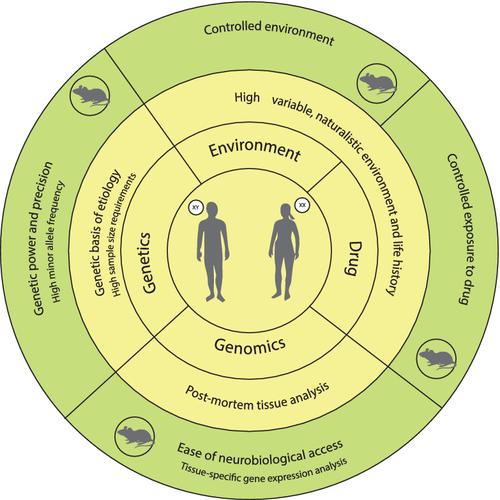当前位置:
X-MOL 学术
›
Genes Brain Behav.
›
论文详情
Our official English website, www.x-mol.net, welcomes your feedback! (Note: you will need to create a separate account there.)
Prospects for finding the mechanisms of sex differences in addiction with human and model organism genetic analysis.
Genes, Brain and Behavior ( IF 2.5 ) Pub Date : 2020-02-11 , DOI: 10.1111/gbb.12645 Udita Datta 1 , Sarah E Schoenrock 2 , Jason A Bubier 1 , Molly A Bogue 1 , James D Jentsch 3 , Ryan W Logan 4 , Lisa M Tarantino 2 , Elissa J Chesler 1
Genes, Brain and Behavior ( IF 2.5 ) Pub Date : 2020-02-11 , DOI: 10.1111/gbb.12645 Udita Datta 1 , Sarah E Schoenrock 2 , Jason A Bubier 1 , Molly A Bogue 1 , James D Jentsch 3 , Ryan W Logan 4 , Lisa M Tarantino 2 , Elissa J Chesler 1
Affiliation

|
Despite substantial evidence for sex differences in addiction epidemiology, addiction-relevant behaviors and associated neurobiological phenomena, the mechanisms and implications of these differences remain unknown. Genetic analysis in model organism is a potentially powerful and effective means of discovering the mechanisms that underlie sex differences in addiction. Human genetic studies are beginning to show precise risk variants that influence the mechanisms of addiction but typically lack sufficient power or neurobiological mechanistic access, particularly for the discovery of the mechanisms that underlie sex differences. Our thesis in this review is that genetic variation in model organisms are a promising approach that can complement these investigations to show the biological mechanisms that underlie sex differences in addiction.
中文翻译:

通过人类和模式生物遗传分析寻找成瘾性别差异机制的前景。
尽管在成瘾流行病学、成瘾相关行为和相关神经生物学现象方面存在性别差异的大量证据,但这些差异的机制和影响仍然未知。模式生物中的遗传分析是发现成瘾性别差异背后机制的一种潜在的强大而有效的手段。人类遗传研究开始显示影响成瘾机制的精确风险变异,但通常缺乏足够的力量或神经生物学机制,特别是在发现性别差异背后的机制方面。我们在这篇综述中的论点是,模式生物的遗传变异是一种很有前途的方法,可以补充这些研究,以显示成瘾性别差异背后的生物学机制。
更新日期:2020-03-27
中文翻译:

通过人类和模式生物遗传分析寻找成瘾性别差异机制的前景。
尽管在成瘾流行病学、成瘾相关行为和相关神经生物学现象方面存在性别差异的大量证据,但这些差异的机制和影响仍然未知。模式生物中的遗传分析是发现成瘾性别差异背后机制的一种潜在的强大而有效的手段。人类遗传研究开始显示影响成瘾机制的精确风险变异,但通常缺乏足够的力量或神经生物学机制,特别是在发现性别差异背后的机制方面。我们在这篇综述中的论点是,模式生物的遗传变异是一种很有前途的方法,可以补充这些研究,以显示成瘾性别差异背后的生物学机制。


























 京公网安备 11010802027423号
京公网安备 11010802027423号